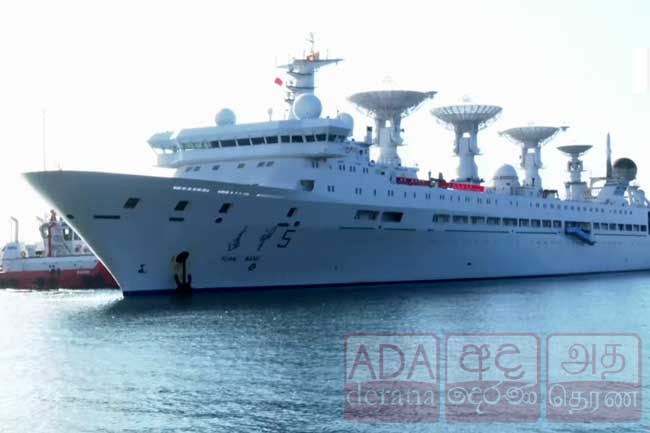Chinese research vessel arrives at Hambantota Port
August 16, 2022 08:42 am
The Chinese research vessel ‘Yuan Wang 5’ has arrived at the port of Hambantota in Sri Lanka this morning (16).
The Yuan Wang 5 survey vessel is described by security analysts as the latest generation of China’s space-tracking ships capable of monitoring satellites, rockets and intercontinental ballistic missiles.
The vessel with some 2,000 sailors on board has facilities to track satellites and intercontinental missiles and is slated to remain at the port till August 22.
The stopover was initially scheduled for August 11, but was delayed at the request of the Sri Lankan government.
According to Sri Lanka’s Ministry of Foreign Affairs, the Yuan Wang 5 was cleared to dock at Hambantota port from Tuesday to August 22 after the government “engaged in extensive consultations at a high level through diplomatic channels with all parties concerned.”
China on Monday said Sri Lanka has allowed its satellite and missile tracking ship to berth at the Hambantota port on August 16, but declined to reveal details of talks with Colombo leading to the island’s government reversing its earlier stand to defer the high-tech vessel’s entry.
“As you said, Sri Lanka has given Yuan Wang-5 the permission to berth at its port,” Chinese Foreign Ministry spokesman Wang Wenbin told a media briefing in Beijing, responding to a question about Colombo giving its nod for the ship to berth at Hambantota Port days after asking it to defer the visit following reported concerns expressed by India and the U.S.
Mr. Wang, however, declined to go into details of Beijing’s talks with Colombo in relation to the berthing of the ship.
“As for the specific questions that you raised, we have mentioned China’s position quite a few times,” Mr. Wang said when asked about what were the “consultations” that were held and the “concerns” addressed.
After Sri Lanka asked it to defer the entry of the ship, China on August 8 reacting angrily said it was “completely unjustified” for certain countries to cite the so-called “security concerns” to pressure Colombo and “grossly interfere” in its internal affairs.
Sri Lankan Foreign Ministry statement on August 13 said that Colombo held extensive consultations about “certain concerns”.
The Sri Lankan Foreign Ministry in its statement explained that it had on August 5 requested the Chinese embassy that the visit of the Chinese ship scheduled between August 11 and 17 to Hambantota port be deferred “in light of certain concerns raised with the ministry” until the conduct of further “consultations on the matter.”
“The government has since engaged in extensive consultations at a high level through diplomatic channels with all parties concerned, with a view to resolving the matter in a spirit of friendship, mutual trust, and constructive dialogue, taking into account the interests of all parties concerned, and in line with the principle of sovereign equality of states,” the statement said.
The Chinese embassy on August 12 applied for clearance of the new dates - from August 16 to 22 - “for replenishment purposes of the vessel”.
“Having considered all material in place”, the clearance to the Chinese embassy “was conveyed for the deferred arrival of the vessel between August 16 and 22”, the Sri Lankan statement said.
The ship with some 2,000 sailors on board with facilities to track satellites and intercontinental missiles will berth at the Hambantota Port which China has taken for a 99-year lease as a debt swap.
Colombo’s permission has also raised speculation that Beijing could make a positive announcement about Sri Lanka’s previous request to defer the loans it owned to China and plead for bridge financing to tide over the crisis until it received International Monetary Fund (IMF) support.
China, which has extensive investments in Sri Lanka running into billions of dollars, has provided $73 million in aid and shipments of rice but maintained a steady silence on Colombo’s request for a bailout package as it became bankrupt after running out of foreign exchange reserves in April this year.
India stepped in with about $4 billion support in terms of multiple lines of credit to buy essential commodities such as fuel, food, and medicines.
China is the main creditor of Sri Lanka with investment in infrastructure. Debt restructuring of Chinese loans would be key to the island’s success in the ongoing talks with the IMF for a bailout.
The southern deep-sea port of Hambantota, which has been developed largely with Chinese loan, is considered strategically important because of its location.
India has said that it carefully monitors any development having a bearing on its security and economic interests.
New Delhi is concerned about the possibility of the ship’s tracking systems attempting to snoop on Indian installations while being on its way to the Sri Lankan port.
India has traditionally taken a stern view of Chinese military vessels in the Indian Ocean and has protested such visits with Sri Lanka in the past.
The Chinese Foreign Ministry on August 15 said it was “completely unjustified for certain countries to cite the so-called security concerns to pressure Sri Lanka.
India on August 12 rejected China’s “insinuations” that New Delhi pressured Colombo against the planned visit by the Chinese research vessel, but asserted that it will take decisions based on its security concerns.
External Affairs Ministry Spokesperson Arindam Bagchi said in New Delhi that Sri Lanka, as a sovereign country, makes its own independent decisions and noted that India would make its judgment on its security concerns based on the prevailing situation in the region, especially in the border areas.
-With Agencies Inputs












